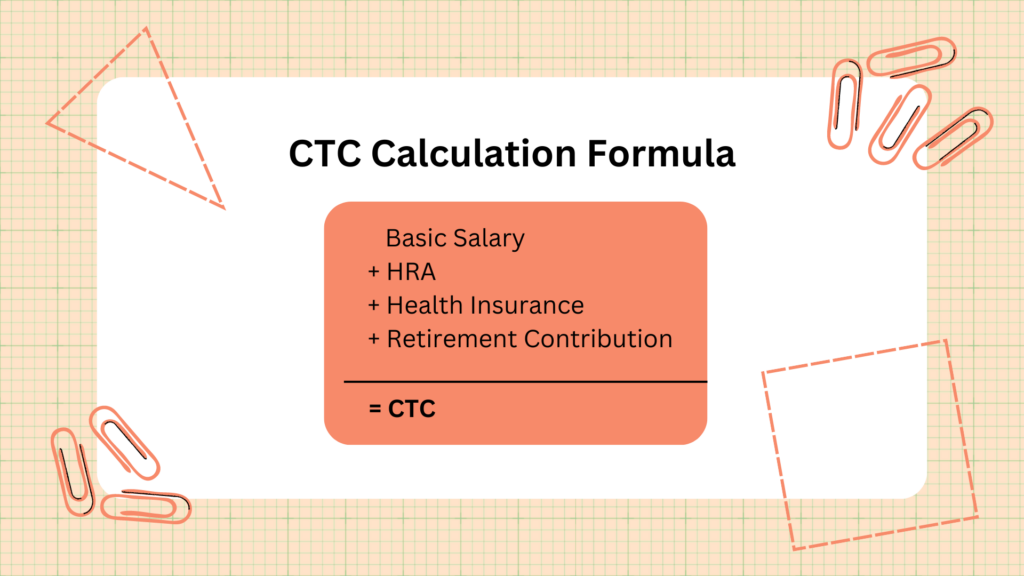
Ever wondered what CTC in salary means? Whether you’re a job seeker, a fresh graduate, or someone looking to understand their paycheck better, CTC is a term you should know. CTC stands for Cost to Company, and it’s a crucial concept in the corporate world. This guide will walk you through what CTC is, its components, and how it impacts your earnings. Let’s understand!
CTC stands for Cost to Company. It is the total amount a company spends on an employee in a year. CTC includes not just the basic salary but a plethora of other benefits and contributions too. Understanding CTC is essential as it gives you a clear picture of your overall salary package.
When we talk about CTC in salary, we’re referring to the entire financial commitment a company makes towards an employee. This means that CTC in salary includes the basic pay, allowances, bonuses, and any other perks provided by the company. It’s an all-inclusive figure that reflects the total cost of hiring and retaining an employee.
CTC includes various components, both direct and indirect, that contribute to the overall cost. The components of CTC typically are:
1. Basic Salary: The fundamental part of the salary, usually 35-50% of the CTC.
2. Allowances:
3. Bonuses and Incentives:
4. Benefits:
5. Perquisites:
6. Gratuity:
A lump-sum payment made to an employee at the end of their tenure, provided they have completed a minimum number of years with the company (typically five years in many countries).
7. Provident Fund (PF) Contributions:
Both employer and employee contributions to a government-mandated retirement savings scheme.
8. Leave Travel Allowance (LTA):
Reimbursement for travel expenses incurred during holidays.
9. Stock Options: Offering employees the opportunity to buy company shares at a later date at a predetermined price.
10. Education Allowance: Reimbursement for the educational expenses of the employee’s children.
These components can vary based on the company’s policies, the employee’s role, and the country of employment.
1. Direct Benefits
Direct benefits in CTC include your basic salary, house rent allowance (HRA), and other cash components that you receive monthly. These are the amounts that are directly credited to your bank account and form a significant part of your CTC.
2. Indirect Benefits
Indirect benefits are non-cash components included in your CTC. These can be health insurance, company car, meal coupons, and any other perks provided by the employer. Although you don’t receive these benefits in cash, they add substantial value to your overall compensation.
3. Saving Contributions
Savings contributions are another critical part of CTC. This includes contributions to your provident fund (PF), gratuity, and other retirement benefits. These contributions might not be immediately available to you, but they ensure long-term financial security.

Calculating CTC can seem daunting, but it’s quite straightforward once you understand the components. Add your basic salary, allowances, bonuses, and indirect benefits to get your total CTC.

Let’s say your basic salary is ₹3,200,000 per year. You receive a house rent allowance (HRA) of ₹800,000, health insurance worth ₹240,000, and a retirement contribution ₹400,000. Your CTC would be:
CTC = Basic Salary + HRA + Health Insurance + Retirement Contribution
CTC = ₹3,200,000 + ₹800,000 + ₹240,000 + ₹400,000 = ₹4,640,000
A salary calculator can be a handy tool to understand your CTC better. By entering your salary components, you can get a detailed breakdown of your CTC, helping you to understand what each component contributes to your overall compensation.
Now-a-days, a diverse range of salary calculators are available. To name a few prominent ones; take-home salary calculators and income tax calculators are mostly used.
Gross salary is the amount you receive before deductions like taxes and provident fund. It includes your basic pay and allowances. However, CTC goes beyond the gross salary. It includes the indirect benefits and savings contributions as well. Thus, while your gross salary forms a part of your CTC, it’s not the entire picture.
Understanding CTC in salary is crucial for every professional. It gives you a broad view of what you’re truly earning and helps you make informed financial decisions. By knowing the components of your CTC, you can better negotiate your salary and benefits, ensuring you get the most out of your employment package. So, the next time you see the term CTC, you’ll know exactly what it entails and how it affects your overall compensation.